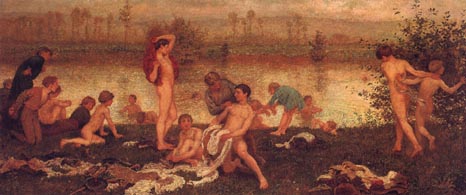
Here is an unfinished poem, probably inspired in part by the Frederick Walker painting reproduced below, by the great Victorian poet, Gerard Manley Hopkins (1844-1889).
Epithalamion
HARK, hearer, hear what I do; lend a thought
now, make believe
We are leafwhelmed somewhere with the hood
Of some branchy bunchy bushybowered wood,
Southern dene or Lancashire clough or Devon
cleave,
That leans along the loins of hills, where a
candycoloured, where a
gluegold-brown
Marbled river, boisterously beautiful, between
Roots and rocks is danced and dandled, all in
froth and waterblowballs,
down.
We are there, when we hear a shout
That the hanging honeysuck, the dogeared hazels
in the cover
Makes dither, makes hover
And the riot of a rout
Of, it must be, boys from the town
Bathing: it is summer's sovereign good.
By there comes a listless stranger: beckoned by the noise
He drops towards the river: unseen
Sees the bevy of them, how the boys
With dare and with downdolphinry and bellbright
bodies huddling out,
Are earthworld, airworld, waterworld thorough
hurled, all by turn and
turn
about.
This garland of their gambols flashes in his
breast
Of summertime joys
That he hies to a pool neighbouring; sees it is
the best
There; sweetest, freshest, shadowiest;
Fairyland; silk-beech, scrolled ash, packed
sycamore, wild wychelm,
hornbeam
fretty overstood
By. Rafts and rafts of flake-leaves light, dealt
so, painted on the air,
Hang as still as hawk or hawkmoth, as the stars
or as the angels there,
Like the thing that never knew the earth, never
off roots
Rose. Here he feasts: lovely all is! No more: off
with -- down he dings
His bleachèd both and woolwoven wear:
Careless these in coloured wisp
All lie tumbled-to; then with loop-locks
Forward falling, forehead frowning, lips crisp
Over finger-teasing task, his twiny boots
Fast he opens, last he offwrings
Till walk the world he can with bare his feet
And come where lies a coffer, burly all of blocks
Built of chancequarrièd,
selfquainèd rocks
And the water warbles over into, filleted with
glassy grassy
quicksilvery
shivès and shoots
And with heavenfallen freshness down from
moorland still brims,
Dark or daylight on and on. Here he will then,
here he will the fleet
Flinty kindcold element let break across his limbs
Long. Where we leave him, froliclavish while he
looks about him,
laughs,
swims
Enough now; since the sacred matter that I mean
I should be wronging longer leaving it to float
Upon this only gambolling and echoing-of-earth
note --
What is ... the delightful dene?
Wedlock. What the water? Spousal love.
. .
. . .
.
. .
. .
. . .
.
. .
Father, mother, brothers, sisters, friends
Into fairy trees, wild flowers, wood ferns
Rankèd round the bower
. .
. . .
.
. .

--Frederick Walker, Bathers (1867).
Hopkins was a great admirer of Walker's art. Originally
intended
to honor the marriage of his brother, Everard, in April 1888, "Epithalamion"
is more a celebration of male beauty than of heterosexual love.
The
scene and the theme is Whitmanesque in feeling if not in diction and
other
uniquely Hopkinsian poetic devices. The homage to "Spousal
love" at the end seems gratuitous, but I disagree with Robert Bernard
Martin,
who writes: "There is a distinct feeling that he [Hopkins] left it
incomplete
because he was unable to imbue the physical world with spiritual
meaning"
(Gerard Manley Hopkins: A Very Private Life, p. 392).
The homoerotic depiction is full of spiritual meaning, but perhaps
Hopkins,
a Jesuit priest, feared his own inclinations and instead of trying to
convert
the numinous adoration of male beauty into adoration of heterosexual
love
he gave up the effort entirely.
Here is another homoerotic poem by Hopkins:
Harry
Ploughman
Hard as hurdle arms, with a broth of
goldish flue
Breathed round; the rack of ribs; the scooped flank; lank
Rope-over thigh; knee-nave; and barrelled shank --
Head and foot, shoulder and shank --
By a grey eye's heed steered well, one crew, fall to;
Stand at stress. Each limb's barrowy brawn, his thew
That onewhere curded, onewhere sucked or sank --
Soared or sank --,
Though as a beechbole firm, finds his as at a roll-call, rank
And features, in flesh, what deed he each must do --
His sinew-service where do.
He leans to it, Harry bends, look.
Back, elbow, and liquid waist
In him, all quail to the wallowing o' the plough: 's cheek crimsons;
curls
Wag or crossbridle, in a wind lifted, windlaced --
See his wind--
lilylocks --laced;
Churlsgrace, too, child of Amansstrength, how it hangs or hurls
Them -- broad in bluff hide his frowning feet lashed! raced
With, along them, cragiron under and cold furls --
With-a-fountain's
shining-shot furls.
Here the quiet priest celebrates, indeed nearly worships, a working
man. Hopkins turns his subject almost into a creature of nature,
a magnificent beast. See also Hopkins's poem, "The Bugler's First
Communion."